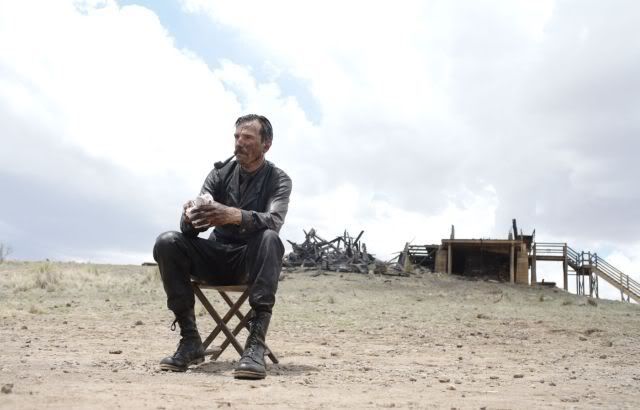
A warm, crisp slice of apple pie smothered hard and rough against the face is an apt sensation one might feel after watching Paul Thomas Anderson's "There Will Be Blood." Every inch and pore of his latest masterpiece breathes the breath of everything flawed and beautiful about America. That slice of apple pie entices with its alluring plumes of fresh baked warmth and savory bite, but it bites hard and reminds you again of how obsessed with consumption and its nasty twin desire. Daniel Day-Lewis tears through the screen as oil magnate and monster Daniel Plainview in what will surely be remembered as one the greatest acts of performance committed in contemporary cinema. His quest for success, wealth, and ownership is a demented compulsion for greed, gluttony, and self-satisfaction. This "competition" inside of him as he puts sears him raw. Add religious hypocrisy, the American west as a geographical metaphor and plane for cultural and gender identity, and the cinematic brio of one of America's most talented filmmakers to this boiling cinematic feat and you are stained with the impression of "There Will Be Blood."
Anderson's point of view has been consistent through an unfortunately short but a clearly evolutionary career. His focus remains interested in the American dream and its relationship to family as demonstrated in his debut feature "Hard Eight" that saw a man offered the promise of a better life, and then again in his new two opuses, "Boogie Nights" and "Magnolia." Both films are set in Los Angeles and utilize southern California as a representation of the fabric of America and all that it has to offer for those willing to gain. Dirk Diggler (Mark Whalberg) is desperate for validation as his star rises in the pornography industry, but ultimately it falls just as rough and quickly as his ascension. Anderson leaves us with Diggler's exaggerated phallus staring at us before the end credits interrupt. It's a perfectly red, white, and blue image in its appreciation and wishful hunger for something bigger and better that every American possesses, male or female. It's the ultimate whip your dick out contest that drives this country.
"Magnolia" is perhaps his most ambitious and polarizing film with its fantastical touch of raining amphibians and cast sing along. At its core the film is an epic rumination on personal and familial success; the failures we encumber along the way as a parent or child. What was promised in its potential in "Hard Eight", "Boogie Nights" and "Magnolia" were stunning, audacious, and coherent works that showed shades of Scorsese and Altman, if not primarily visually but his ability to observe his characters and somehow make them emblematic of an accessible truth. "Punch-Drunk Love", no slouch of a film either, showcased a new, intimate maturity that wasn't concerned with the histrionics of showmanship but the execution of a story of two people who meet and fall in love. Charming and surprisingly sweet, "Punch-Drunk Love" was Anderson's twisted fore into comedy. For such a light and breezy film that does leave the viewer slightly punch-drunk due to its flair, "There Will Be Blood" is a jolting departure that thankfully for us, delves into something dark and wickedly grandeur.
The structure of "There Will Be Blood" percolates like the oil reservoir Plainview taps from. As a burgeoning oil baron he picks up an orphan (a pitch perfect and natural Dillon Freasier) to pass off to potential investors that he is a decent family man with decent ambitions. His mission is simple--hoard as much oil in the widest range through any means necessary. The ocean of oil below will be his. In one of the film's most wrenching scenes, an oil tower combusts, knocking his son to the side and rendering him permanently deaf. Plainview quickly rescues his son, but races back to the scene to tend to the more important blood that courses through his veins, the oil. Day-Lewis begins his journey into one of the nastiest bastards ever etched across the screen. Cinematographer Robert Elswit beautifully captures the beast as Plainview watches his tower burn into the night. Coated in spits of oil, Day-Lewis contorts his face in varying hues of disappointment, rage, and vengeance, all the while not entirely caring about the fate of his son. Day-Lewis' presence will haunt you with his voice that enunciates in a clipped manor but sounds as if his desire for oil has worn his voice hoarse. His thick, dirty mustache and sun burnt skin peer at fearing land owners and businessmen. He cuts through the scenes efficiently and determined to win his race for oil. It's an act that cannot be described too effusively.
His son's hearing plays as a minor problem as he faces off against the local preacher boy, Eli Sunday, wonderfully played by Paul Dano. Dano's moon pie face and screeching sermon-giving voice belies his ulterior motives for religious brainwashing and pocket fueling. His screen time with Day-Lewis is like watching a great boxing match. Sunday sells the land to Plainview for drilling with the additional cost of endowing his church. Sunday damns the sin out of his local townspeople with great evangelical ferocity. His churchgoers are as pious as Plainview is as passionate about making more money and owning more land to drill. Plainview like every apathetic American sees through the shit and show of Sunday's routine. Doppelgängers they are not entirely, but Anderson deftly manages to skewer and expose our country's sickness with achievement and success in the contemporary context of faith as a springboard for that sought after fulfillment. Success to Plainview is through the self, not attributed through God or anyone else. What a provocative idea and perhaps a dangerously recognizable one. What have we have become if our quest for personal fulfillment is through the singular? Anderson smacks that pie in our face at this point but continues to rub it in for the rest of the film.
It would be a great disservice if I gave away moments and specific scenes because within the two hour and thirty-eight minute frame that Anderson works and works, he gives us such perfectly pure and profound pieces of pleasure as we watch a man full to the brim with displeasure. He eats, breathes, sleeps, and bleeds oil, or rather determination and the constant craving for more. The climactic and operatic ending explodes like nothing I've seen or experienced before. A bowling alley in Plainview's palatial and inland estate is the ring for a final showdown between the film's opposing forces. The forces rip and belch at each other with such intensity that one could mistake it for the geysers of oil erupting so splendidly in the first third of the film. This scene makes me grateful that this brand of polished and audacious filmmaking is being achieved. Joy is an odd adjective to describe what one feels at the closing credits of "There Will Be Blood" but maybe that's the real danger in Anderson's brilliant tome on America as America is today. We live in a peculiar time in which our president obsesses over oil, domination, and a deranged compulsion for more, more, more. We as a culture have never been more overweight, over-fueled, and over-consumed by that tricky American idea that we can achieve success at any level. When will it ever be enough? Film has not been this essential since the '70s heyday of Anderson's largest influences, Altman and Scorsese.
Friday, January 25, 2008
america, america
Posted by
w.
at
5:34 PM
![]()
![]()
Labels: film, paul thomas anderson, triumphs
Subscribe to:
Post Comments (Atom)



No comments:
Post a Comment